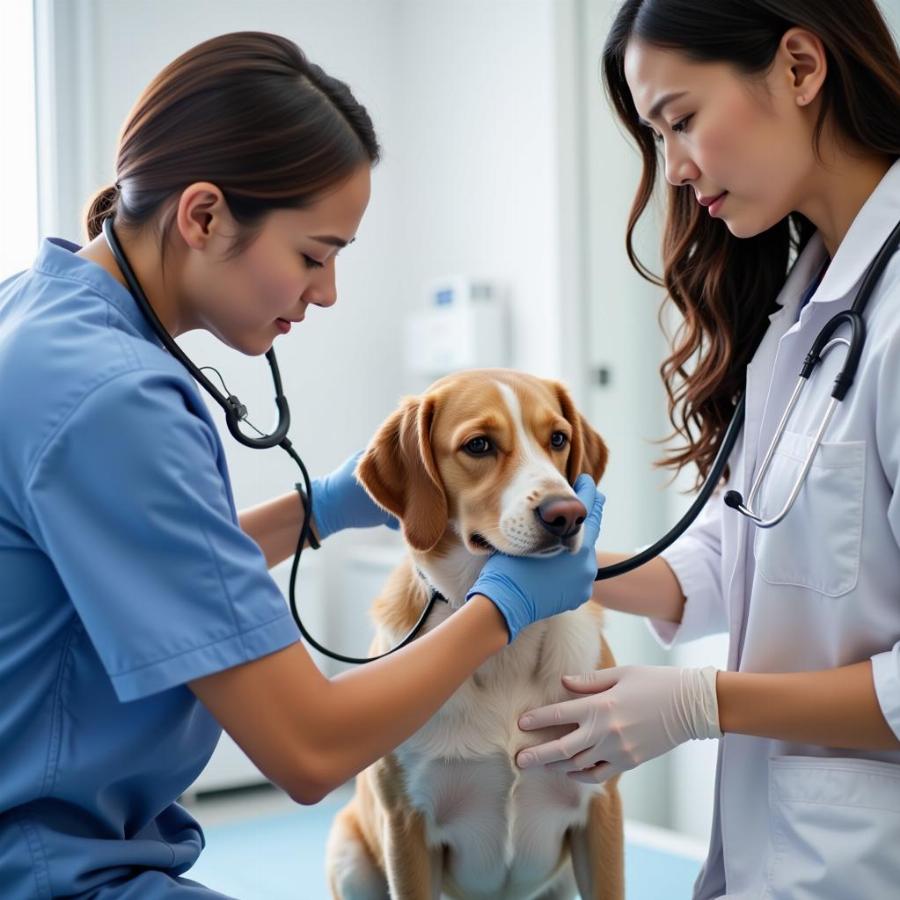Gastroenteritis in dogs, often causing vomiting and diarrhea, is a common concern for pet owners. Understanding gastroenteritis dogs recovery time is crucial for providing appropriate care and knowing when to seek veterinary help. While most cases resolve within a few days, some can linger longer, depending on the underlying cause and the dog’s overall health. Let’s explore the factors influencing recovery time and what you can do to help your furry friend bounce back.
Understanding Gastroenteritis in Dogs
Gastroenteritis, simply put, is inflammation of the stomach and intestines. This can be caused by a variety of factors, from dietary indiscretion (eating something they shouldn’t) to bacterial or viral infections like Clostridium perfringens or parvovirus. Symptoms often include vomiting, diarrhea, lethargy, loss of appetite, and abdominal pain.
Common Causes of Gastroenteritis
- Dietary Indiscretion: This is a leading cause, often involving scavenging garbage, eating spoiled food, or sudden changes in diet.
- Infections: Bacterial, viral, and parasitic infections can all lead to gastroenteritis.
- Stress: Changes in routine, travel, or new environments can sometimes trigger digestive upset.
- Food Allergies or Intolerances: Certain ingredients can cause inflammation in the gut.
- Inflammatory Bowel Disease (IBD): A chronic condition requiring long-term management.
- Pancreatitis: Inflammation of the pancreas can also cause gastrointestinal symptoms.
Gastroenteritis Dogs Recovery Time: What to Expect
The recovery time for gastroenteritis in dogs varies considerably. Mild cases, often caused by dietary indiscretion, may resolve within 24-48 hours with supportive care. However, more severe cases, especially those involving infections or underlying health issues, can take several days or even weeks to fully resolve.
Factors Influencing Recovery Time
- Cause of Gastroenteritis: Viral infections may take longer to clear than simple dietary indiscretions.
- Severity of Symptoms: Dogs with severe vomiting and diarrhea may require longer to recover.
- Dog’s Age and Overall Health: Puppies, senior dogs, and those with pre-existing conditions may have a more prolonged recovery.
- Treatment: Prompt and appropriate treatment can significantly shorten recovery time.
How to Help Your Dog Recover from Gastroenteritis
- Veterinary Care: If your dog’s symptoms are severe, persistent, or accompanied by other signs like fever or lethargy, consult your veterinarian immediately. They can diagnose the underlying cause and recommend appropriate treatment.
- Bland Diet: Offer small, frequent meals of easily digestible foods like boiled chicken and rice or a prescribed veterinary diet.
- Hydration: Encourage your dog to drink water frequently to prevent dehydration. Your vet may recommend electrolyte solutions for severe cases.
- Rest: Ensure your dog gets plenty of rest in a quiet, comfortable environment.
- Medications: Your veterinarian may prescribe medications to control vomiting, diarrhea, or address underlying infections.
 Chăm Sóc Chó Bị Viêm Ruột
Chăm Sóc Chó Bị Viêm Ruột
Gastroenteritis Prevention
- Proper Diet: Feed your dog a high-quality, balanced diet and avoid sudden changes in food.
- Avoid Table Scraps: Many human foods are toxic to dogs and can trigger gastroenteritis.
- Vaccination: Keep your dog up-to-date on vaccinations to protect against infectious diseases.
- Parasite Control: Regularly deworm your dog and use preventative medications to control fleas and ticks.
- Hygiene: Maintain a clean environment and pick up after your dog to prevent exposure to harmful bacteria and parasites.
Conclusion
Gastroenteritis dogs recovery time depends on a variety of factors, ranging from the cause and severity of the illness to the dog’s overall health. By understanding these factors and providing appropriate care, you can help your furry friend recover quickly and comfortably. Remember to consult with your veterinarian for accurate diagnosis and treatment, especially if symptoms are severe or persistent. dog clostridium perfringens and clostridium in dogs offer further insights into specific bacterial causes of gastroenteritis.
FAQ
- How long does it take for a dog to recover from gastroenteritis? Recovery time varies, typically ranging from 24 hours to several weeks, depending on the underlying cause and severity.
- What should I feed my dog with gastroenteritis? A bland diet of boiled chicken and rice or a prescribed veterinary diet is often recommended.
- When should I take my dog to the vet for gastroenteritis? If symptoms are severe, persistent, or accompanied by other signs like fever or lethargy, consult your veterinarian immediately.
- Can gastroenteritis be contagious to other dogs? Some forms of gastroenteritis, particularly those caused by infectious agents, can be contagious.
- How can I prevent my dog from getting gastroenteritis? Proper diet, hygiene, vaccination, and parasite control are crucial preventative measures.
- What are the signs of dehydration in a dog with gastroenteritis? Signs include lethargy, dry gums, sunken eyes, and loss of skin elasticity.
- Can stress cause gastroenteritis in dogs? Yes, stress can sometimes trigger digestive upset.
Beaut Dogs is your trusted source for all things canine, offering expert advice on dog breeds, care, health, and much more. Visit us at Beaut Dogs to learn everything you need to know about caring for your beloved companion. When you need support, contact us via Email: [email protected] to get detailed and accurate answers from Beaut Dogs.